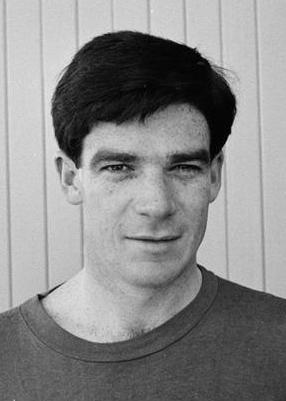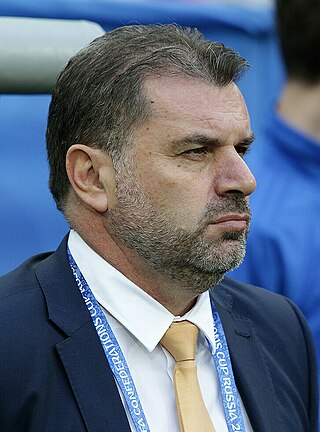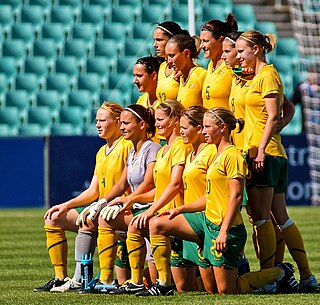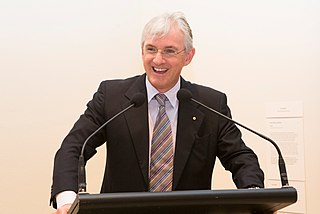Related Research Articles

The Fédération Internationale de Football Association, more commonly known by its acronym FIFA, is the international self-regulatory governing body of association football, beach soccer, and futsal. It was founded in 1904 to oversee international competition among the national associations of Belgium, Denmark, France, Germany, the Netherlands, Spain, Sweden, and Switzerland. Headquartered in Zurich, Switzerland, its membership now comprises 211 national associations. These national associations must also be members of one of the six regional confederations: CAF (Africa), AFC, UEFA (Europe), CONCACAF, OFC (Oceania), and CONMEBOL.

Harry Kewell is an Australian soccer coach, manager and former player. He was most recently the manager of Yokohama F. Marinos in the J1 League.

Football Australia is the governing body of soccer, futsal, and beach soccer within Australia, headquartered in Sydney. Although the first governing body of the sport was founded in 1911, Football Australia in its current form was only established in 1961 as the Australian Soccer Federation. It was later reconstituted in 2003 as the Australian Soccer Association before adopting the name of Football Federation Australia in 2005. In contemporary identification, a corporate decision was undertaken to institute that name to deliver a "more united football" in a deliberation from the current CEO, James Johnson. The name was changed to Football Australia in December 2020.

John Norman Warren, MBE, OAM was an Australian soccer player, coach, administrator, writer and broadcaster. He was known as Captain Socceroo for his passionate work to promote the game in Australia. The award for the best player in the A-League is named the Johnny Warren Medal in his honour.
A-League Men is the highest-level professional men's soccer league in Australia and New Zealand. At the top of the Australian league system, it is the country's premier men's competition for the sport. A-League Men was established in 2004 as the A-League by the Australian Soccer Association (ASA) as a successor to the National Soccer League (NSL) and competition commenced in August 2005. The league is currently administered by the Australian Professional Leagues (APL), contested by thirteen teams; eleven based in Australia and two based in New Zealand. The men's, women's and youth leagues have now been brought together under a unified A-Leagues banner.

Sir Frank P. Lowy is an Australian-Israeli businessman of Jewish Slovak-Hungarian origins and the former long-time chairman of Westfield Corporation, a global shopping centre company with US$29.3 billion of assets under management in the United States, United Kingdom and Europe. In June 2018 Westfield Corporation was acquired by French company Unibail-Rodamco.

Football West is the state governing body for soccer in Western Australia (WA). It is affiliated with Football Australia (FA), the sport's national governing body, and through FA's affiliation to FIFA. Football West's premier competition is the National Premier Leagues Western Australia, which is the highest league in WA and one tier below the national A-League. NPL WA is a division within the National Premier Leagues. Football West is also responsible for running Western Australia's National Training Centre in conjunction with FA and the WA Government's Department of Local Government, Sport and Cultural Industries (DLGSC). Football West also runs the Football West State Cup knock-out cup. Since 2014 the two State Cup finalists also qualify for the Australia Cup.

In Australia, Soccer, also known as British football, is the most played outdoor team sport, and ranked in the top ten for television audience as of 2015. The national governing body of the sport is Football Australia (FA) which comprises nine state and territory member federations, which oversee the sport within their respective region. The season in Australia is played during the summer, to avoid clashing with Australian rules and Rugby league which dominant spectator and media interest there.

The Australia men's national soccer team represents Australia in international men's soccer. Officially nicknamed the Socceroos, the team is controlled by the governing body for soccer in Australia, Football Australia, which is affiliated with the Asian Football Confederation (AFC) and the regional ASEAN Football Federation (AFF).

St George FC, commonly called Saints or Budapest, is a semi-professional Australian soccer club based in the St George district in the south of Sydney. The club was founded by Hungarian immigrants in 1957 as Budapest Club and by 1965 was renamed to St. George-Budapest Club.
John Anthony O'Neill AO is an Australian sporting administrator and businessman. He has been involved with both rugby union and soccer at the national level, after being Managing Director of the State Bank of New South Wales up until 1995.

West Adelaide Soccer Club is an Australian soccer club currently playing in the South Australian NPL. Traditionally named Hellas, the club was founded by members of the Greek community of Adelaide. West Adelaide became a founding member of the National Soccer League in 1977 and a year later became the first Adelaide team to be crowned national champion when it won the 1978 National Soccer League after a 1–1 draw in the final round match with Adelaide City in the local derby.

Angelos Postekos is a soccer manager and former player who is the head coach of Premier League club Tottenham Hotspur.
Altona City SC is an Australian all-inclusive association football (soccer) club from Altona, Victoria, a suburb of Melbourne, Victoria. The club was formed in 1965 with four fundamental countries contributing it its establishment and growth - England, Scotland, Malta and The Netherlands.The club played in the Victorian State League from 1977 to 1981.
Bonita Mersiades is an Australian corporate affairs practitioner, sports administrator and writer. Until 24 January 2010, Mersiades was Head of Corporate and Public Affairs with the Football Federation Australia and was also a member of the Senior Management Team for the Australian 2018 and 2022 FIFA World Cup bid.

Women's soccer, also known as women's football, is a popular sport in Australia. The sport has a high level of participation in the country both recreational and professional. Football Australia is the national governing body of the sport in Australia, organising the A-League Women, the Australian women's national team, and the nine state governing bodies of the game, among other duties. Women's participation of modern soccer has been recorded since the early 1920s. It has since become one of Australia's most popular women's team sports.
Moya Dodd is an Australian soccer official, a lawyer and former national team player. She is a former executive committee member of the Asian Football Confederation (AFC) and a former member of the FIFA Council.

Steven Mark Lowy is a leading Australian businessman and philanthropist. He is the former co-chief executive officer of Westfield Corporation, a leading global shopping centre company that was acquired by French company Unibail-Rodamco in 2018 in what was one of the largest transactions in Australian corporate history. His principal activities now focus on investments associated with the Lowy family’s private company, Lowy Family Group, as well as a number of philanthropic and community roles including as Deputy Chairman of Australia's leading foreign policy think tank, the Lowy Institute; a director of the Lowy Foundation and Lowy Medical Research Foundation and Neurotech Pharmaceuticals Inc; President of the Hakoah Club; a board member and trustee of Keren Hayesod-UIA; and on the Executive and Board of Governors of the Jewish Agency for Israel.
Remo Nogarotto is an Australian businessman and football executive. Nogarotto is Executive Chairman for Corporate Advisory for the C|T Group and is a board member of Football Federation Australia.
Chris Nikou is the current chairman of Football Federation Australia and an Australian lawyer.
References
- ↑ "The World Today - Disquiet as Soccer Australia trio resign". Australian Broadcasting Corporation .
- ↑ "PM - Soccer Australia officially canned". Australian Broadcasting Corporation .
- ↑ "PM - Soccer Australia officially canned". Australian Broadcasting Corporation .
- ↑ "Football Australia Governance | Football Australia". www.footballaustralia.com.au. 2022-03-07. Retrieved 2024-10-05.
- ↑ "Archived copy" (PDF). Archived from the original (PDF) on 2014-03-06. Retrieved 2014-03-05.
{{cite web}}: CS1 maint: archived copy as title (link) - ↑ "Football: Steven Lowy lashes FFA critics through exit door". Wide World of Sports. 19 November 2018.